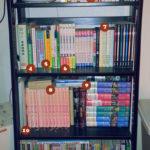I’ve been using Pimsleur for Japanese practice for a while now. The first level I really breezed through, because it was all so super basic I pretty much knew 80-100% of the material on each lesson on first listen, so it took me about a month, about what you’d expect given it’s 30 lessons of 30 min each, and I did probably on average 1 per workday (M-F), with some days getting through 2. The second got a little more difficult, but I still managed to get through most lessons with just one listen, so it took me only a couple months total, though I had a break in the middle, I believe. The third level I’ve been working on for a couple months now and I’m halfway through. Mostly it’s still not that I don’t understand or know the material at all so much as I only know it passively, and have to activate it so that when I think I want to say the phrase, I can actually come up with it. And since they’re longer sentences, I’ve been listening to each lesson more l like 4-5 times each to make sure I have close to instant recall.
Basically, I find Pimsleur is really good for conversational practice of a sort. It doesn’t really beat having an actual conversation partner, but it’s good at helping build up confidence to string simple sentences together (and work on inflection and pronunciation if you have difficulties with that). And the best part to me is that it is an entirely audio course, so it’s something I can do in the car without having to put in time with a textbook, so the time I wasn’t using for anything useful anyway can get put to studying. And I suppose if you can get it for cheap and you’re a beginner, or if you’re intermediate who has never worked much on speaking practice, it might be worth it.
That said there’s a lot of criticism of the course I tend to agree with, also. Like this review mentioned, it feels a lot like a course that is specifically geared toward a married businessman, and if you’re not one, it’s sometimes pretty weird or awkward in the choice of dialog scenarios you have to go through, and you’re probably not going to directly use most of the phrases you learn. To me, that doesn’t mean it’s not useful– personally I have a lot of trouble just coming up with sentences on my own, especially when I have very minimal vocabulary, which is why I really enjoy having Pimsleur do the “creative” side for me in the early stages.
In the downsides specific to Japanese, all the usage patterns are either polite or teinei, which, while it’s nice to know, I know is making me sound a little extra formal and weird. I’m actually not sure if there’s any good resources for specifically learning what forms of speech to use in which situations, because Japanese is so complex about it; I think I really need to start doing sentences in Anki that I pull from things I watch. I suspect context and practice is pretty much going to be the best way to figure it out, though I also plan on picking my tutor’s brain more.
Anyway, I just started using Pimsleur’s beginning Mandarin course as well, which has been an interesting experience. I attempted to use the beginning Russian course a while ago, but found that since I didn’t have any intuition about the pronunciation/word-break rules in Russian, it was much too difficult to follow along.
My practical level in Mandarin is almost nil. I was so terrified of sounding incorrect while growing up, that I refused to say even simple things like 你好, so my mouth is not used to pronouncing words. But I have had a lifetime of familiarity with hearing the sounds of the spoken language and a year of formal study, which means I’m probably still ‘ahead’ of people, because I do already have some ear for phrases and nuance that a complete beginner wouldn’t. As I’m only on Lesson 6, I’m still not entirely up to the idea of trying to speak Chinese with my mother, who was always one of the worst critics of my pronunciation. But I’m feeling like I’m getting there. I’ve made a half-deal with myself that, if not before then, at least by the time I finish the first level, I have to try to use some Chinese with my mom, even if it’s just as simple as, “Hi, how’re you?”
I keep being a little concerned/annoyed that most of the language materials I find teach a Beijing accent? I’m not sure where I’d find much material to teach a Taiwan accent, though, so I figure it’ll just have to be something that once I reach a point of moderate conversation, I’ll just have to have my mom and aunties (oh god, I’m definitely not ready for those conversations yet) tell me if I sound too weirdly Beijing.

